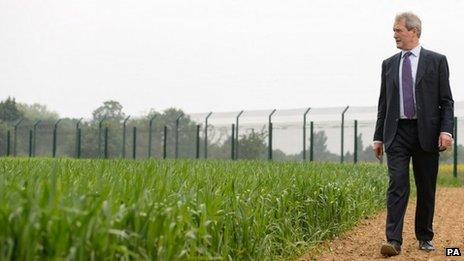GM 'golden rice' opponents wicked, says minister Owen Paterson
- Published

Owen Paterson is known as a strong supporter of GM food technology
Opponents of the development of a type of genetically modified (GM) rice enriched with vitamin A are "wicked", the environment secretary has said.
In an interview with the Independent, external, Owen Paterson said they could be condemning millions of people in the developing world to a premature death.
Mr Paterson backed a letter from international scientists calling for the rapid development of "golden rice".
But campaigners say the benefits claimed for the rice are misleading.
'Dark shadow'
Mr Paterson told the newspaper: "It's just disgusting that little children are allowed to go blind and die because of a hang-up by a small number of people about this technology.
"I feel really strongly about it. I think what they do is absolutely wicked. There is no other word for it."
Mr Paterson did not specify any particular groups in his interview but also said opponents of GM technology were "casting a dark shadow over attempts to feed the world".
BBC political correspondent Carole Walker said Mr Paterson was known as a strong supporter of GM crops but his language seemed certain to raise hackles with those who took a different view.
A Department for Environment, Food and Rural Affairs spokeswoman said it was Mr Paterson's strong personal view.
'Cause for outrage'
People in the developed usually world get enough vitamin A from their diet by eating foods like cheese, yoghurts and eggs.
But deficiency is a common problem in developing countries, and is estimated to affect between 140 million and 250 million children under the age of five.
Vitamin A is needed for healthy skin and eyes and to help strengthen the immune system so that the body can fight infections. Deficiency can lead to blindness, illness and death.
Supplements are available and the World Health Organisation advocates routine administration of vitamin A in countries where deficiency is a problem.
High doses of vitamin A can be harmful, however, particularly in pregnancy
Meanwhile, in a letter to US journal Science, a group of leading academics has accused Western non-governmental organisations of fuelling opposition to the development of GM technologies.
They wrote: "If ever there was a clear-cut cause for outrage, it is the concerted campaign by Greenpeace and other non-governmental organisations, as well as by individuals, against golden rice."
Environmental campaigners such as Greenpeace and Friends of the Earth have said there are more effective solutions to vitamin A deficiency.
Mr Paterson also used the interview to defend the government's handling of the badger cull - aimed at preventing the spread of bovine TB - against criticism from animal welfare groups.
He said: "I cannot understand anyone wanting to tolerate this disgusting disease.
"I find it incomprehensible that these badger groups don't see that this is a horrendous disease for the badgers themselves."
- Published5 August 2013
- Published23 July 2013
- Published18 July 2013
- Published12 July 2013
- Published20 June 2013
- Published10 December 2012
- Published30 July 2012
- Published15 July 2012
- Published26 June 2012